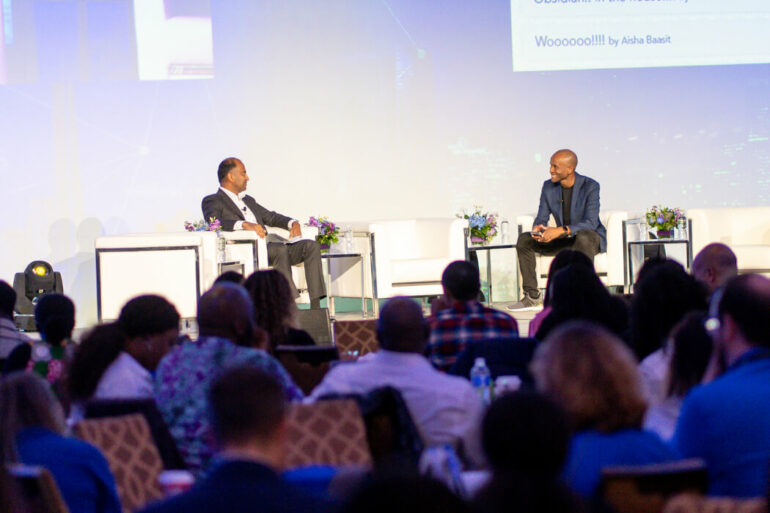This October, the Black Professionals in Tech Network (BPTN) launched its three-day BFUTR Global Tech Summit, the largest virtual conference for Black tech professionals in the world, with a ‘hybrid’ bang.
Now in its fourth year, the Summit introduced its diverse panel of leaders in banking and business to untapped talent in tech—Black startup founders or prospective employees trying to get their foot in the door. The idea is to create opportunities for Black tech talent in a way that recognizes the opportunity quotient runs both ways. That idea in itself is disruptive to an industry where, according to a 2016 Brookfield Institute study, Black tech workers make up only 2.6 percent of the tech workforce in Canada, and are also the lowest paid.
But BPTN continues to grow its numbers, currently counting over 50,000 members, which defies the idea that there aren’t many Black tech professionals.
Here are three big takeaways from the conference.
Day one: investing in diverse talent is a smart investment in your business
On day one, a virtual “tech talk” between the founder of BPTN Lekan Olawoye and the keynote speaker Tim Clark, SVP and CIO of commercial platforms, architecture and engineering for TD, laid out the case for the necessity of a conference like this in Toronto. Diversity, equity, and inclusion (DEI) conversations can be awkward and oftentimes insincere in their execution, but a focus on both business and social impact makes a huge difference.
“From a business perspective, you want to build your brand as the place to be,” said Clark. “Why is it the place to be? Because you’re investing in talent.”
“Black professionals are over qualified because we don’t get the benefit of the doubt” @LekanOlawoye #BFUTR2022 #BlackInTech pic.twitter.com/4wS7ha6VSZ
— Debora Jesus (@dbrjesus) October 21, 2022
Speaking to that investment, Olawoye referenced the Obisidi Academy partnership Between BPTN and TD, whereby Black Canadian talent can enter into a paid three-month full-stack developer training program with guaranteed job placement.
“This is what’s needed today because it’s not some front desk job that may be automated out in a year or two,” Olawoye said. “This is about having a career where you can become the next Tim Clark because you are building skills, networks, and relationships with mentors who will champion you because they’ve significantly invested in your talent.”
Day two: center people over products to succeed
Day two presented insights from a Capital One-sponsored panel around “People First Technology.” The discussion focused on the importance of leveraging empathy towards your customers and your employees to successfully sell your product.
“You should take the time to understand what your customer cares about so you can translate their needs into meaningful products and services,” said Arthur Deane, VP of cyber for Capital One.
“Diversity of thought brings a competitive edge.” -Mina McCollum #BFUTR #BFUTR2022
— COZY (@olaovita) October 21, 2022
“For as many years as we’ve spent working to improve our technology, sometimes we forget it’s about the customer and associate,” said Maureen Jule-Perez, managing VP of people technologies for Capital One. “Engineers are makers, and we need to set time aside to refocus to avoid burnout by modernizing applications like cloud-native, open source, API and automation—deploy them in a way that’s agile but takes our developer’s time into consideration—so developer experience is key at Capital One.”
Day three: crawl, walk, run

This year, BFUTR featured a star-studded IRL line-up at the Sheraton Centre Hotel that included Daily Show host Trevor Noah as a keynote speaker and a closing night concert by hitmaker Rick Ross. But it was the panel discussing how to convert global audiences during a recession that made an important point on commercializing attention.
“Crawl, walk, run means running your startup with patience while following your intuition,” said Shontay Lundy, founder of Black Girl Sunscreen. “We started off digitally because it was inexpensive, but now we have billboards. Understanding your customer, building out supply chains and growing manpower in line with customer demand is integral to the success of your business.”


